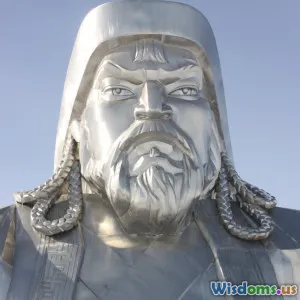
Leaders Who Shaped Modern Society
7 min read Explore transformative leaders who reshaped modern society through vision, courage, and groundbreaking ideas. (0 Reviews)
Leaders Who Shaped Modern Society
Modern society, with its complex political systems, social structures, and vast technological advancements, stands on the shoulders of visionary leaders. These individuals, through courage, innovation, and unwavering commitment, have steered humanity’s course towards progress and equity. Understanding their influence not only offers a window into our past but inspires future generations to lead with conviction and purpose.
Introduction: The Power of Leadership in Shaping Society
Leadership is more than holding positions of power; it is about vision, influence, and the capacity to inspire change. Throughout history, certain leaders have emerged whose ideas and actions left indelible imprints on the fabric of societies worldwide. Their lives illustrate how leadership can harness societal forces, challenge norms, and ignite revolutions—both peaceful and violent—that redefine how societies operate.
Take, for example, the 20th century—an era marked by unprecedented upheaval and progress. From the fight against colonialism and apartheid to gender empowerment and economic reform, leaders manifested diverse approaches to guide societies.
Defining Characteristics of Transformative Leaders
Before examining these remarkable individuals, it’s crucial to identify traits that set transformative leaders apart:
- Visionary Thinking: The capacity to imagine a better future. For instance, Martin Luther King Jr.’s dream of racial equality galvanized a generation.
- Moral Courage: Standing firm in beliefs despite opposition. Nelson Mandela’s 27 years in prison symbolized extraordinary resolve.
- Adaptability: Navigating socio-political shifts effectively. Margaret Thatcher’s approach to economic reform underscored adapting conservatism to modern needs.
- Empathy: Connecting deeply with the masses, as seen in Mahatma Gandhi’s nonviolent resistance forging widespread support.
With these in mind, let's journey through a select few leaders whose legacy has profoundly influenced modern societal constructs.
Nelson Mandela: The Embodiment of Forgiveness and Justice
Nelson Mandela’s leadership in the struggle against apartheid in South Africa is a masterclass in resilience and reconciliation. Imprisoned for nearly three decades, Mandela’s unwavering belief in equality and human dignity transformed South Africa’s political landscape.
- Impact: After his release in 1990, Mandela led negotiations that dismantled institutionalized racial segregation.
- Legacy: His presidency fostered a new constitution committed to democratic principles and equal rights.
Mandela’s statement, “It always seems impossible until it’s done,” captures the spirit of overcoming entrenched systemic barriers through leadership anchored in vision and patience.
Mahatma Gandhi: Pioneer of Nonviolent Resistance
Gandhi’s revolutionary philosophy of Satyagraha—insistence on truth and nonviolent civil disobedience—charted a radical path for political struggle during British colonial rule in India.
- Strategies: Organized mass movements like the Salt March, empowering ordinary citizens.
- Global Influence: Inspired subsequent movements for civil rights globally, including the American Civil Rights Movement.
Gandhi’s emphasis on moral authority over physical force demonstrates how ethical leadership can reshape political realities peacefully.
Margaret Thatcher: The Iron Lady Who Reshaped Economics
As the first female Prime Minister of the United Kingdom (1979-1990), Margaret Thatcher broke glass ceilings and aggressively pursued market-oriented reforms.
- Policies: Reduced state intervention, promoted privatization, and focused on controlling inflation.
- Controversy and Outcome: While criticized for increasing inequality, Thatcher’s tenure arguably revitalized a stagnating British economy and influenced neoliberal policies worldwide.
Her famously declared sentiment, “Watch your thoughts, for they will become actions,” encapsulated her pragmatic and determined leadership style.
Franklin D. Roosevelt: Architect of the American New Deal
Taking office at the height of the Great Depression, FDR confronted economic catastrophe with unprecedented policy innovation.
- New Deal: Instituted financial reforms, public works programs, and social safety nets that redefined government’s role in citizens' welfare.
- World War II Leadership: Guided the U.S. through global conflict, setting the stage for the post-war modern international order.
Roosevelt’s adaption to crises exemplifies how dynamic leadership stabilizes society in turbulent times.
The Role of Leadership in Today’s Global Context
The lessons from these leaders resonate now amid new challenges: climate change, pandemics, social inequality, and geopolitical tensions. Their examples encourage:
- Pursuing ethical leadership with a vision for inclusive progress.
- Emphasizing adaptability in rapidly evolving situations.
- Harnessing nonviolence and diplomacy over aggression.
Conclusion: Inspiration for Future Leaders
The story of modern society is incomplete without acknowledging these towering figures whose leadership helped craft the world we inhabit. By studying their successes and shortcomings, contemporary leaders and citizens alike gain a blueprint for positive change.
Leadership shaped by courage, empathy, and vision remains central to addressing today’s complex problems. In the words of Mandela, minimum the true change takes “will not come if we wait for some other person or some other time. We are the ones we’ve been waiting for. We are the change that we seek.”
As we reflect on their legacies, may we be inspired not only to admire but to act—to move society forward with a renewed commitment grounded in the profound examples of those who came before us.
References and Further Reading
- Mandela, N. (1994). Long Walk to Freedom.
- Gandhi, M.K. (1927). An Autobiography: The Story of My Experiments with Truth.
- Thatcher, M. (1993). The Downing Street Years.
- Roosevelt, F.D. (1933-1945). Presidential addresses and policy documents.
- King Jr., M.L. (1963). I Have a Dream speech transcript.
Rate the Post
User Reviews
Popular Posts














